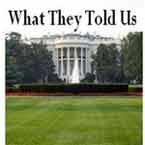
|
 |
Rasmussen...
What They Told Us:
Reviewing Last Week’s Key Polls
Saturday, March 19, 2011
Much of America’s focus this past week has been on events across the
Pacific and what they mean here at home.
Over 90% of voters have been following news reports about the
devastating earthquake and subsequent tsunami that hit Japan, events
that triggered a still unfolding crisis at a nuclear plant there. Sixty
percent (60%) of voters believe the Japanese earthquake will hurt the
U.S. economy, and just over one-in-four plan to donate money to help
the stricken island nation.
One early consequence of the situation in Japan appears to be weakening
support for the building of new nuclear plants in this country. Now
just 40% of voters favor the building of more nuclear plants in the
United States, the lowest level of support in nearly three years of
surveying. There was a similar backlash against offshore oil drilling
last year following the massive oil leak in the Gulf of Mexico, but
support has since rebounded.
Voters are closely divided over whether Japan is giving the world the
straight story about the problems at the Fukushima nuclear plant. After
all, 45% are now at least somewhat concerned that any radiation that
escapes from Japanese nuclear plants may reach the United States,
including 18% who are Very Concerned. This is virtually unchanged
from earlier in the week.
As world markets react to Japan’s immense problems, Americans don’t
need any more economic bad news.
Just 22% of Likely U.S. Voters now think the United States is heading
in the right direction, the lowest level of confidence found since
before President Obama’s inauguration in January 2009.
The number of voters who think America’s best days still lie ahead is
now at its lowest level in 17 months. Only 34% predict that the
country’s best days are in the future, the lowest finding since October
2009. Forty-eight percent (48%) say America’s best days are behind us,
identical to last month and the highest level of pessimism since last
July.
Homeowners are more pessimistic about both the short-term and long-term
housing market. Now only 44% expect the value of their homes to go up
in the next five years.
The Rasmussen Investor Index hit a new low for the year this past week,
while the companion Rasmussen Consumer Index continued to stumble along
barely above its lowest readings since September of last year. The
indexes measure the daily economic confidence of consumers and
investors.
But voters continue to express little confidence in government as the
solution to the nation’s economic problems. Forty-seven percent (47%)
of voters, in fact, still worry that the federal government will do too
much in reacting to the nation’s current economic problems. Thirty-nine
percent (39%) fear that the government will not do enough. These
findings are in line with voter sentiments since November 2008 just
after Obama’s election and the Wall Street meltdown. Just 27% think the
government bailouts of banks, auto companies and insurance companies
were good for the United States.
At the same time, support for repeal of the national health care law
reached 62% this past week, the highest level since May of last year.
The number of voters who believe the plan will increase the cost of
care has tied its highest level since the law’s passage a year ago.
Obama ended the week with little change in his overall job approval
numbers as measured by the Rasmussen Reports daily Presidential
Tracking Poll.
Yet in spite of the unhappiness with some of the government’s recent
actions, roughly half of Americans already have filed their income
taxes with a month to go until the deadline. That’s on track with the
level of filing in previous years.
But most continue to believe the middle class pays a bigger share of
its income in taxes than those who are wealthy, and they favor an
income tax system where everyone pays the same percentage of their
income.
Americans are not willing to pay more in taxes to reduce the country’s
historic-level budget deficit. Just 20% of Adults would be willing to
pay higher taxes for that purpose. But then 83% say the size of the
deficit is due more to the unwillingness of politicians to cut
government spending than to the reluctance of taxpayers to pay more in
taxes.
Still, Americans aren’t prepared yet to abruptly cut the size of the
government work force. Only 26% of Adults think it would be good for
the economy if the federal government laid off 100,000 workers.
Forty-nine percent (49%) say a layoff like that would be bad for the
economy. Fourteen percent (14%) say it would have no impact. However,
in a separate poll, 60% of voters recently indicated a willingness to
cut the federal payroll by 10% over the next decade.
The federal government in fiscal year 2009 had 4.43 million employees,
including nearly 1.6 million men and women in the armed services. USA
Today reports that the average federal worker’s pay and benefits
totalled $123,049 in 2009, while on average private workers made
$61,051 in total compensation. It’s unclear if this finding includes
military personnel.
The government worker issue is most visible these days on the state
level as Republican governors in several states including Wisconsin and
Ohio are challenging public employee unions in an effort to overcome
sizable budget deficits.
Members of public employee unions prefer Democrats over Republicans on
the Generic Congressional Ballot by a 28-percentage-point margin. Among
private sector union members, the gap is half that size.
Read the full story with links at Rasmussen
|
|
|
|

